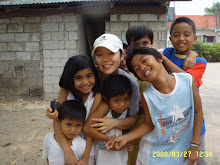“We risk our lives to get to them first because we believe we are more sympathetic agents of change than profit-hungry commercialists”.
Missionaries who venture out into the wilderness have some kind of motivation that connects with the message of Christ. Their attempts to reach those who have been “untouched” such as the primitives and native tribes are led with the purpose displayed in the quote above: to deliver the message of God before the commercialists make contact with the undeveloped tribes first.

Some might ask that wouldn’t the missionaries be destroying the cultures themselves in order for the conversion in religion. However, as Don Richardson states, “It’s true that we destroy certain things in cultures, just as doctors sometimes must destroy certain things in a human body if a patient is to live.” Missionaries do not have the intention to tear down the culture – they just feel the need to save the people by spreading the word of God. In another way, however, it sounds as if we are pushing Christianity into the arms of people who do not require it. It seems as if the unique culture and religion of that specific group of people is being muddled.
Don Richardson however, points out that missionaries do more than introduce a new religion and try to persuade them to believe it. In the article, he pointed out the question of “Should anyone go in?” (in tribes where people are not aware of the message of God) is obsolete, since someone will eventually. Missionaries strive to teach the tribes not only spiritual truth, but physical survival as well. The missionaries try to teach the people about money, language, medication, trading, and other skills to survive before they make contact with outsiders.
 By reading Don Richardson’s article, I felt that sympathy is the key to all doors of missionary missions. Don Richardson says, “…part of my task was to give the Sawi a rational basis for voluntarily renouncing cannibalism before the guns of the police decided the issue”. This quote reveals that since the Sawi are part of the people under a government – a government that does not allow cannibalism, the Sawi need to stop killing and eating people. Essentially, Don Richardson is persuading the Sawi to stop their belief in cannibalism before they are forced to do so while being concerned with their future encounter with commercialists.
By reading Don Richardson’s article, I felt that sympathy is the key to all doors of missionary missions. Don Richardson says, “…part of my task was to give the Sawi a rational basis for voluntarily renouncing cannibalism before the guns of the police decided the issue”. This quote reveals that since the Sawi are part of the people under a government – a government that does not allow cannibalism, the Sawi need to stop killing and eating people. Essentially, Don Richardson is persuading the Sawi to stop their belief in cannibalism before they are forced to do so while being concerned with their future encounter with commercialists. As messengers of God’s word, I believe the motivation that missionaries have that gives them the courage to confront the wilderness is sympathy. Underneath sympathy, there would be teaching them about their own language, culture, and medication while naturally teaching the word of Christ. It is also par to their safety because the missionaries are, in a sense, preparing for their encounter with commercialists.
http://www.tamilucc.com/images/christianity2.jpg





